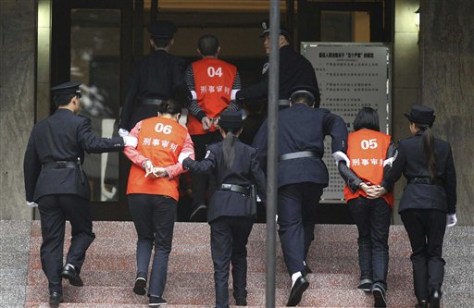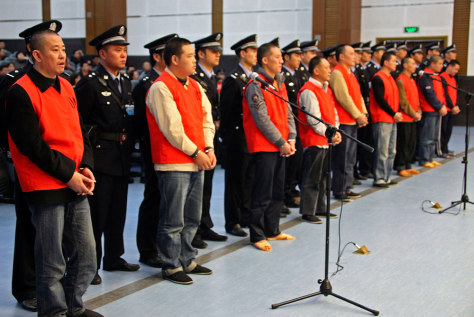
Suspects involved in mafia-style gangs are escorted by police to stand trial at the Chongqing No.5 Intermediate People's Court in Chongqing, China, Oct. 14. The trials of the gangs are exposing sordid, deep-seated connections between organized crime and corrupt officials and police in the central mega-city of Chongqing.
BEIJING — After she refused a corrupt cop's demand that she turn her teahouse into an illegal casino, three thugs beat Chen Yanling with electric batons, sending her to the hospital for nearly a month.
Chen is now getting some vicarious revenge, joining the throngs outside a courthouse where modern-day China's biggest, most lurid mob trials are under way.
The trials are exposing sordid, deep-seated connections between organized crime and corrupt officials and police in the central mega-city of Chongqing, once known as Chungking. Among the suspects: the 46-year-old sister-in-law of the city's deputy police chief, who is accused of running 20 illegal gambling halls, all protected by the police.
Labeled the godmother of the Chongqing underworld, Xie Caiping's profanity-laced testimony drew a rebuke from the judge last week, but delighted the public, which reveled in tales in the local media that she kept 16 lovers.
Such salacious details and more — the lowly paid deputy police chief acquired a $4.4 million villa with his ill-gotten gains — have been given unusually riveting coverage by the state media, which normally shrinks from revelations of corruption that touch the ruling Communist Party.
Six sentenced to death
On Wednesday, six gang members were sentenced to death for crimes that included murder and blackmail; they were the first among hundreds expected to go on trial. Twenty-five others accused of belonging to "mafia-style" organizations were given sentences ranging from one to 18 years in prison.
On Wednesday, six gang members were sentenced to death for crimes that included murder and blackmail; they were the first among hundreds expected to go on trial. Twenty-five others accused of belonging to "mafia-style" organizations were given sentences ranging from one to 18 years in prison.
The proceedings at the city's No. 5 Intermediate People's Court have drawn hundreds each day, among them victims like teahouse owner Chen, who was attacked three years ago and came to watch as handcuffed suspects wearing bright orange vests were escorted to trial.
"Although my case hasn't been solved yet, I already feel better. Many people who know my situation told me 'Chen Yanling, the day you've waited so long for has finally come. You're finally liberated,'" Chen said.
Chongqing's crackdown, which began last summer, has been surprisingly extensive, netting more than 1,544 suspects — gangsters, prominent businessmen and 14 high-ranking officials. The latter include the second-in-command at the police criminal investigation division and the deputy director of the Higher People's Court, as well as a local legislator and the deputy director of the city's coal safety bureau.
Intended to display the Chinese leadership's renewed resolve to stamp out corruption, the Chongqing campaign has instead highlighted how entrenched criminal gangs have become throughout China.
"Local governments have essentially lost control over organized crime," said Ming Xia, a professor at The City University of New York who studies China's criminal underworld. He said an internal report by the national police ministry estimated that China had 2 million to 3 million people involved in organized crime in 2004 and 4,200 "mafia-style syndicates." He believes the number of participants may be as high as 4 million.
Beer-supply networks
In central Henan province, gangs run beer-supply networks. In southwestern Chengdu, they steal medicine and resell it. In northern Hebei province, nearly 100 gangsters put on trial last month were involved in businesses ranging from entertainment to seafood wholesaling and parking; 10 were sentenced to death.
In central Henan province, gangs run beer-supply networks. In southwestern Chengdu, they steal medicine and resell it. In northern Hebei province, nearly 100 gangsters put on trial last month were involved in businesses ranging from entertainment to seafood wholesaling and parking; 10 were sentenced to death.
The pervasiveness marks a remarkable resurgence for gangs, which were almost completely eradicated in the first decades of Communist rule.

Yang Tianqing, first left, and other unidentified suspects allegedely involved in mafia-style gangs stand trial at the Chongqing No.1 Intermediate People's Court in Chongqing, China, on Oct. 12.
Over the past 30 years, the economic boom caused by free-market reforms forced the Communist Party to withdraw from many areas it formerly controlled, clearing the way for new gangs to emerge and conspire with officials who held bureaucratic power but were poorly paid.
Gangs started out in traditional rackets — drug trafficking, smuggling luxury cars and extortion — in the 1980s. As China's economy evolved, they moved on to loan-sharking and evicting tenants from land for real estate development. Tax reform in the mid-1990s sent revenue to Beijing at the expense of local governments, making local officials and police eager to cash in on the money-making opportunities offered by gangs.
The leadership now sees the link between endemic corruption and organized crime — or "black societies" in Chinese — as a threat to its very existence, diminishing the party's already-low popularity.
"In reality organized crime is now delegitimizing the mainland Chinese government because it penetrates deep into the society and economy and brings about and perpetuates bureaucratic corruption," said Sonny Lo, a professor of political science at Canada's University of Waterloo.
‘The tradition of violence’
As a report in the official Xinhua News Agency, put it: "'Black' power is not only expanding to economic sectors, it is also trying to infiltrate into politics, damaging the image of the party and the country."
As a report in the official Xinhua News Agency, put it: "'Black' power is not only expanding to economic sectors, it is also trying to infiltrate into politics, damaging the image of the party and the country."
Chongqing, a hilly city alongside the Yangtze River known for its steamy hot summers, has a long history of banditry and underworld crime. A century ago, the city hosted the secret societies known as "triads." During the ultra-radical Cultural Revolution in the 1960s, armed groups belonging to different communist factions battled it out.
"In Chongqing, we can say there has been a continuity of rebelling groups, the secret societies, as well as the tradition of violence," said Xia of City University.
Over the past decade, Chongqing took off economically when the government separated the city from Sichuan province, making it a province-level municipality and pouring in investment to boost development in less-prosperous inland China.
Recruits among ex-prisoners, jobless
New gangs thrived, finding a steady stream of recruits among ex-prisoners and the jobless.
New gangs thrived, finding a steady stream of recruits among ex-prisoners and the jobless.
Among the gang leaders sentenced to death on Wednesday was Liu Zhongyong, who ran an unlicensed coal mine that twice caved in, killing three miners. Defendants still on trial include Li Qiang, an entrepreneur and delegate to Chongqing's legislature who allegedly hired gangsters to infiltrate taxi companies and organize a strike by over 8,000 taxi drivers last November.
And of course there was Xie, the gambling hall owner. She once absconded with a suitcase full of money after being tipped off by her brother-in-law, deputy head of police Wen Qiang, before a police raid on one of her premises, according to the Southern Weekend newspaper. Last year, gang members she hired beat an undercover police officer unconscious, put him in a bag and dumped him in the countryside.
Gangsters are often hired as muscle to settle disputes. Huang Guobi, a farmer, said her husband was killed when seven gang members broke into their house and attacked him to settle a land dispute. Her husband was stabbed more than 20 times; she suffered 10 stab wounds, she said.
"We were screaming for help, but nobody came," Huang said. "I passed out and regained consciousness after I was sent to the hospital. All villagers know those people are gangsters. They gamble, steal or rob all the time."

No comments:
Post a Comment
Comments always welcome!